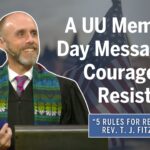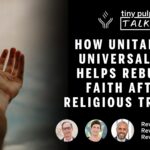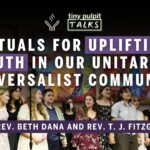Gesundheit! | Rev. Dr. Daniel Kanter | 11.05.23

In the final sermon in our “Rituals That Ground Us” series, Rev. Dr. Daniel Kanter asks “What are the blessings in our lives that really matter?”
Sermon Transcript
When someone sneezes, we say “bless you,” which really these days means “I hope you don’t get me sick.” And we usually say it taking steps back, right? But it was once believed that during a sneeze, the soul could exit through the body causing ill health so folks said, God bless you to ward off this danger. Besides the obvious silliness of the superstition, imagine the kind of concern you might have for people, the people around you, the worry that their souls could fly out of their noses. Having a prominent nose, I think you should worry a little more for me. But imagine the worry that your friend or neighbor or the person sitting next to you in church or on an airplane, the kind of worry you’d have if you thought their soul could be lost. That deep concern about each other is something I wish on all of you. Because if we walk around the world pondering the souls of others, and I don’t mean I’m praying for your soul in that Texas kind of way, but rather I am thinking about the deep concern I have for you, then we will be better for it.
That is the kind of community I believe that we are building here in this church, holding each other’s wellness, holding it beyond the… Next thing we might say is, “You should try this medication,” or “You should go to my doctor,” but rather I care for who you are with a true sincerity. That’s something we can all work on, I think. God bless you.
Reflecting On the Many Forms of Blessings
From the pure traditional point of view, a blessing is kind of hard to understand these days. Blessing used to mean something divine was going to happen, something that changes the air, the space, the people in it, the land, the meaning of lives and the trajectory of things. As a clergy person, I have been called on to do just that. I have blessed new homes, I have dedicated children on this stage and new members. I have blessed members of this church dying slowly at home. I have blessed AIDS patients and their families at San Francisco General Hospital in the mid ’90s. I have been asked to bless meals at friends’ homes, wedding couples at the altar, new ministers entering the service of the church, city council meetings and political appointees. I have blessed patients about to have abortions in the clinic where I used to give my time. I have blessed you every time I have preached to you over 22 years with the benediction that you know by heart if you’ve been attending. That benediction is to send you on your way being held by me and by us and by God. I have said it a thousand times, like so many blessings. I have yet to be asked to bless a new boat, car, or major athletic event.
When I served my church in Boston before coming here a long time ago, I had a man who attended my church. By today’s standards he would be considered developmentally challenged. He sang at the top of his off-key lungs, he dragged his dirty feet down the middle aisle of this upscale historic church, and he was late for every Sunday worship and he came all the way down and sat right in the front, beaming a big jolly smile at the preacher. And every Sunday after church he came to me in the line and he said, “Father, father bless me.” And he stood in front of me with his head bowed and his eyes closed, and I did just what he wanted. I blessed him every Sunday. I put my hand on his head and said a blessing.
The Sunday before I left to come here to Texas, the same thing happened. He shuffled out of church and into line and he came and he said, “Father, father bless me,” and he put his head down and closed his eyes and I touched him and I gave him a blessing. And when he opened his eyes, I held him and said, “I want you to know that all these weeks you have blessed me.” He smiled, his big toothless grin, and said, “Bless you,” and shuffled out. But his blessing was being one of my most faithful parishioners in that crusty Bostonian church, a person who showed up without pretense, full of joy and gratitude.
I have also received other blessings in my life. I received my grandfather’s blessing at my wedding. In his own way he took Marianne and I aside and told us how thrilled he was, which was a long way for him to come given that he refused to attend my parents’ wedding because my mother was not Jewish. And I had been blessed by the Dalai Lama. This thread that I wear in my stole was blessed in the hands of the Dalai Lama and these threads that are on the bottom of my stole in the mountains of where my call were threads that were on the prayer shawl of my grandfather, and I think of his father before him, the Jewish prayer shawl. So I feel blessed by my ancestors every time I put this stole on.
And I’m guessing that you have also been blessed, even if you didn’t notice, in so many casual ways from the have an amazing day from that insurance agent on the other end of the phone, to God bless you from the grocery clerk. That happens in Texas, for those of you who are online and don’t know that. That happens all the time. Or it comes in the simple act of kindness of someone noticing you when you really needed it. It happens in the blessing of a parent on a sick child or in some ways in being forgiven or accepting forgiveness because blessing can change who you are.
The Story of Abraham: A Lesson in Trust
One of the main characters in the Bible for this issue of blessing that we’re talking about in this sermon series of Rituals That Ground Us is Abraham. In our reading, he and Sarah are told by God they will have millions of descendants like the stars in the sky. Without any proof he believed what God told them. He didn’t have to do anything but believe.
Now I know this story can be used by some in Israel today to perpetuate domination rather than cooperation. It perpetuates also the idea, that religious idea that a little faith goes a long way, that mustard seed kind of stuff. The promise that you can do anything and God will give you what you need if you just believe. To me that seems like a setup. If you just have a little more faith, no problems will occur in your life. Is that true? No. I’m guessing most of you rejected that and found your way here. We aren’t the have a little faith and all will be well kind of people.
But the truth in this story is that there is a deeper thread than both of those interpretations. Abraham wasn’t all that faithful. Abraham had a vision. The word came to him. The first word was do not be afraid, which means that Abraham was afraid. He was living out in the desert a long way from Whole Foods and internet access. He was just hoping and praying that all things for him and his elderly wife would go smoothly. They had few resources or any sense of security or safety. So the story goes, God says to Abraham, “Don’t be afraid, you will have a lineage.” Of course, Abraham’s first response was, “What will you give me?” Which if we’re honest, is a little petty if you’re talking to God. Don’t respond that way.
But then God says, “Come out into the air. Step out into the desert. Come out from your tent and the shelter and what gives you a sense of security. Come out into the open. The stars are shining bright.” And if you can imagine the world 10,000 years ago, there’s no artificial light to hem back the darkness. Abraham sees the colors of the stars and the millions of shapes and constellations and swirling rivers of light against the darkness, and God says, “Count them if you can.” What God was saying to Abraham and to us through this ancient story that never happened and was never meant to be thought of as literal was, “Look up. You aren’t in control here. As many stars that you can count is how much you don’t understand about life and the world.” The meaning of this moment for us and for Abraham is rest in the world’s swirling activity. Let the world happen a little. And when you catch your breath, count your blessings, not your curses.
For me, the Abraham story is about trust. It’s about acting as if the universe is trustworthy and figuring out that you can manage what comes to you. And that is what this church is about. That kind of message that says, life is hard and hard to understand, so rest in it. Let the world happen a little. You are held in a love they sang. And when you catch your breath, count the blessings, not the curses. Whether the risks you take and trust are on God or the person sitting next to you, the same thing is true, life is a gamble. Being strengthened for the journey is what keeps us going. Blessings are important to seal the bonds that we have with one another and help us to see one another, to show each other that we care.
Blessings can happen in everyday moments also, moments we don’t control or deliberate on, moments that show us visions of who we can be as a human population.
A Story About A Blessing from Naomi Shihab Nye
Naomi Shihab Nye, the poet, in one of her poems tells a story, a blessing. She says that one day she was at the Albuquerque airport after learning her flight was delayed she heard an announcement that said, “If anyone in the vicinity of gate A4 understands any Arabic, please come to the gate immediately.” She says, “Well, one pauses these days when you hear that kind of announcement.” But that was her gate so she went there and an old woman full of traditional Palestinian embroidered dress, just like her grandmother wore was crumpled on the floor and wailing. “Help,” said the flight agent, “Talk to her. What is her problem? We told her the flight was going to be late and she did this.”
So Naomi Shihab Nye stooped and put her arm around the woman and spoke in Arabic. The minute the woman heard the words that she understood, she stopped crying. She thought the flight had been canceled. She said, “No, we are going to be okay.” She said, “The woman said I had to be in El Paso for medical treatment.” “No, we will be okay,” she said. And then she said, “Who is picking you up? Let’s call him.” And they called the woman’s son and Naomi spoke to him in English. And then just for fun, they called the other son. And then they called Naomi’s father, and the woman and her father spoke in Arabic. And then they found out that they knew 10 people in common.
And then she thought, just for the heck of it, let’s call some more people, so she put some Palestinian poet friends of hers on and let her chat and two hours went by with the woman. By then the woman was laughing, telling her about her life and patting Naomi’s knee and answering questions. And then she pulled out a sack of homemade [foreign language 00:15:06], cookies, little powdered sugar, crumbly mound stuff with dates and nuts from her bag and was offering them to all the women in the gate. Not a single woman declined. “It was like a sacrament,” Naomi Shi said. The traveler from Argentina, the mom from California, the lovely woman from Laredo, they were all covered in the same powdered sugar and smiling.
And then the airline broke out the apple juice, and two girls from the flight ran over and started handing it out to everyone, and everyone was covered in powdered sugar. And Naomi said she noticed her new best friend was carrying a plant like the old country people do, something medicinal, something that reminds them always to be rooted to somewhere. And Naomi said, “And I looked around at the gate of late and weary ones and I thought, ‘This is the world I want to live in, a shared world.’ Not a single person in that gate, once the crying of confusion stopped, seemed apprehensive of any other person. They took the cookies. I wanted to hug all those other women,” she says. “This can still happen anywhere. Not everything is lost.”
The Miracle of Blessings
I love that story. And I want to say to you, if you comfort or notice another who needs comforting, if you revere the world, and something tells you that this is making you want to be a better person, if you create a community out of pain and everyone is covered in powdered sugar or just a couple people feel better about their lives, that is blessing. Blessings change the air and the space and the people in it and the land and the meaning of lives and the trajectory of things. And if you don’t think you can bless someone, then go practice. Reach out to someone who needs a blessing or just pronounce a silent blessing over someone you see. The world needs us to bless one another. If you pronounce silent blessings then pay attention to what happens in the air between you and everyone around you.
The world needs us to bless things and people because there’s a shortage of people willing to kneel wherever they are and recognize the holiness holding it, holding us all in its bony and tender hands. That we are able to bless one another at all is evidence that we have been blessed, whether we can remember it or not. That we are willing to bless one another is a miracle in itself.
So friends, I say to you, you are blessed whether you know it or not. Give and receive blessings today and you will find that it’ll change your life and others. God bless. God bless you, gesundheit, and go forth and do likewise. Bless each other and the world, we need it. Amen. Amen.








